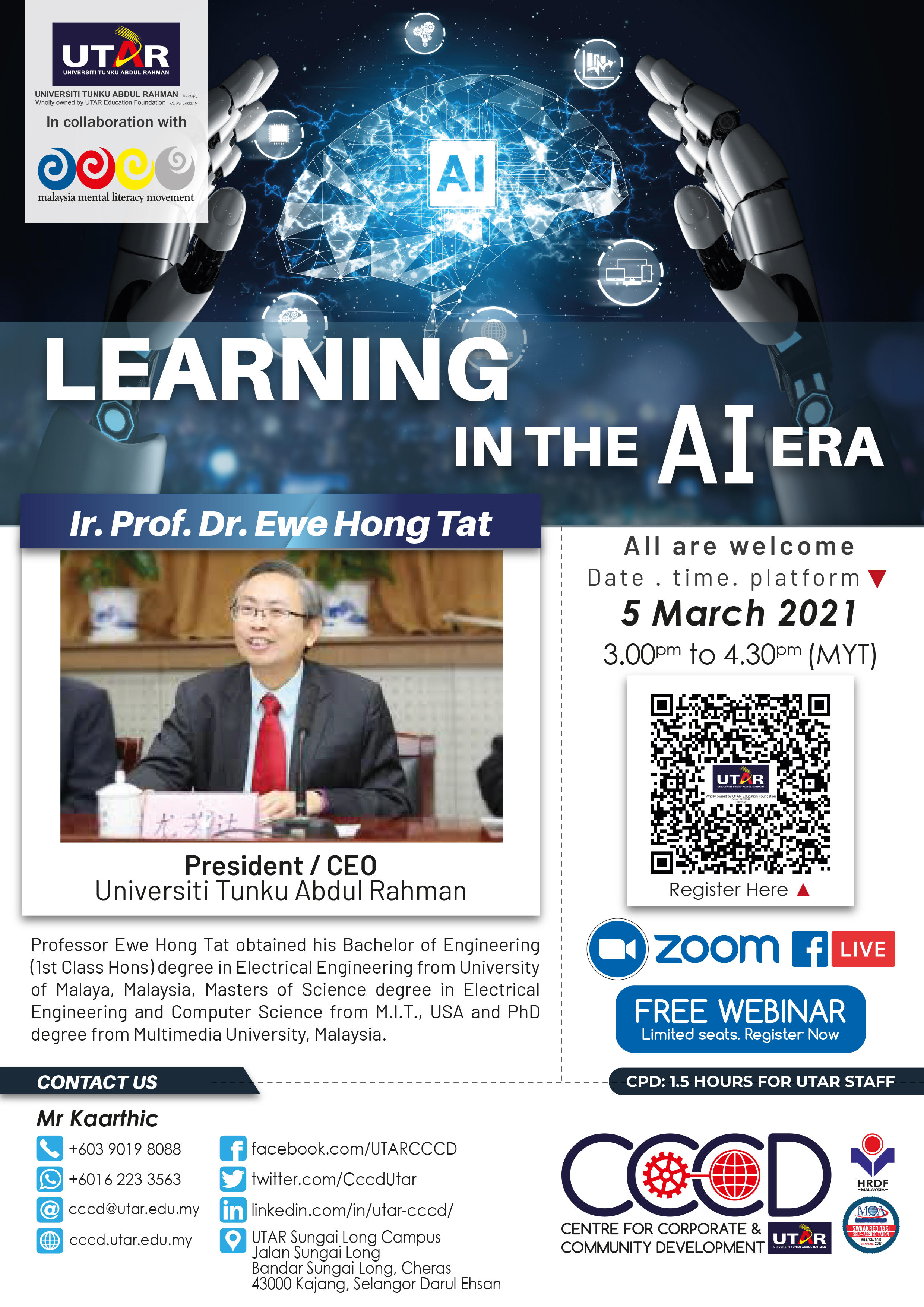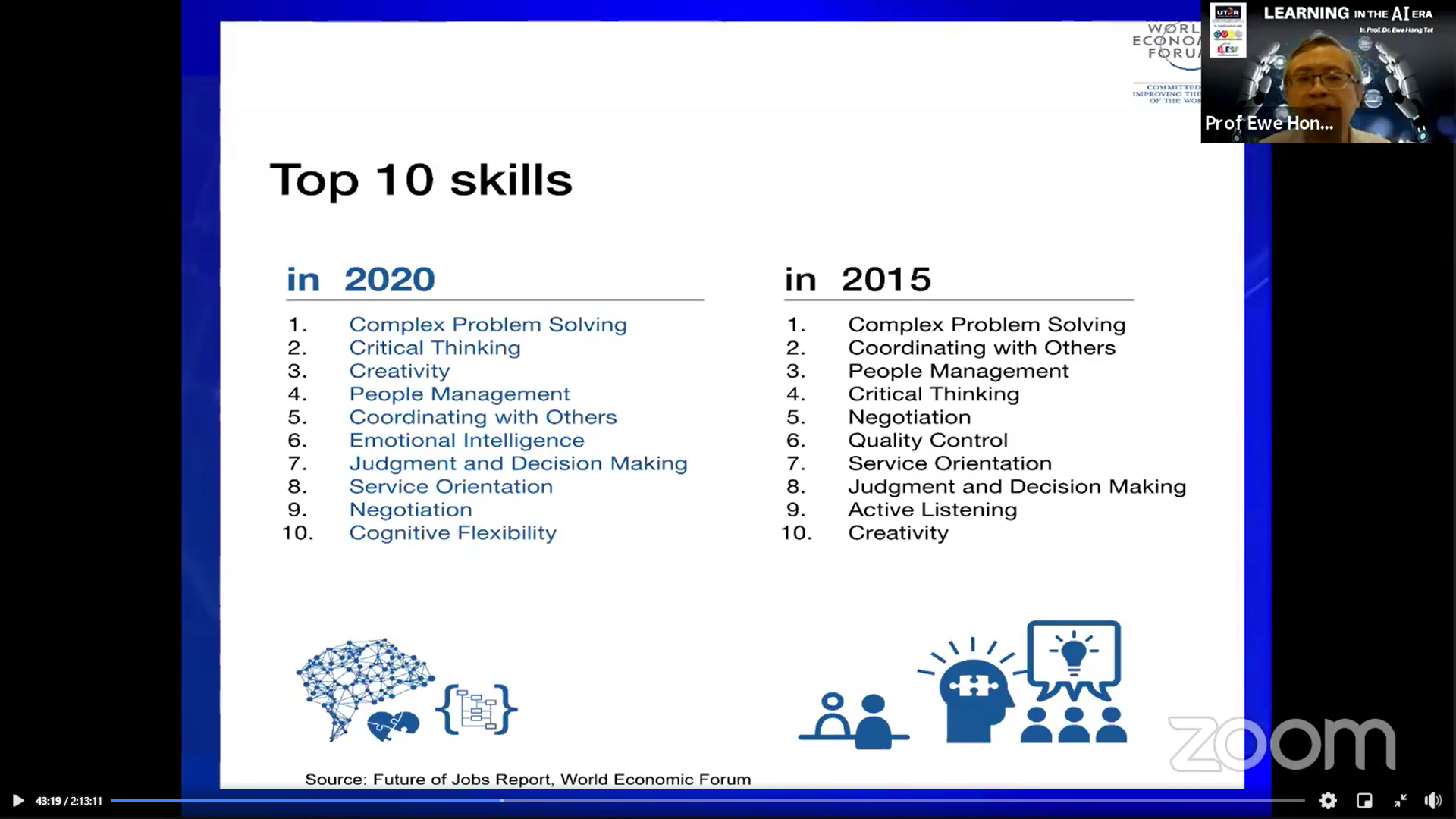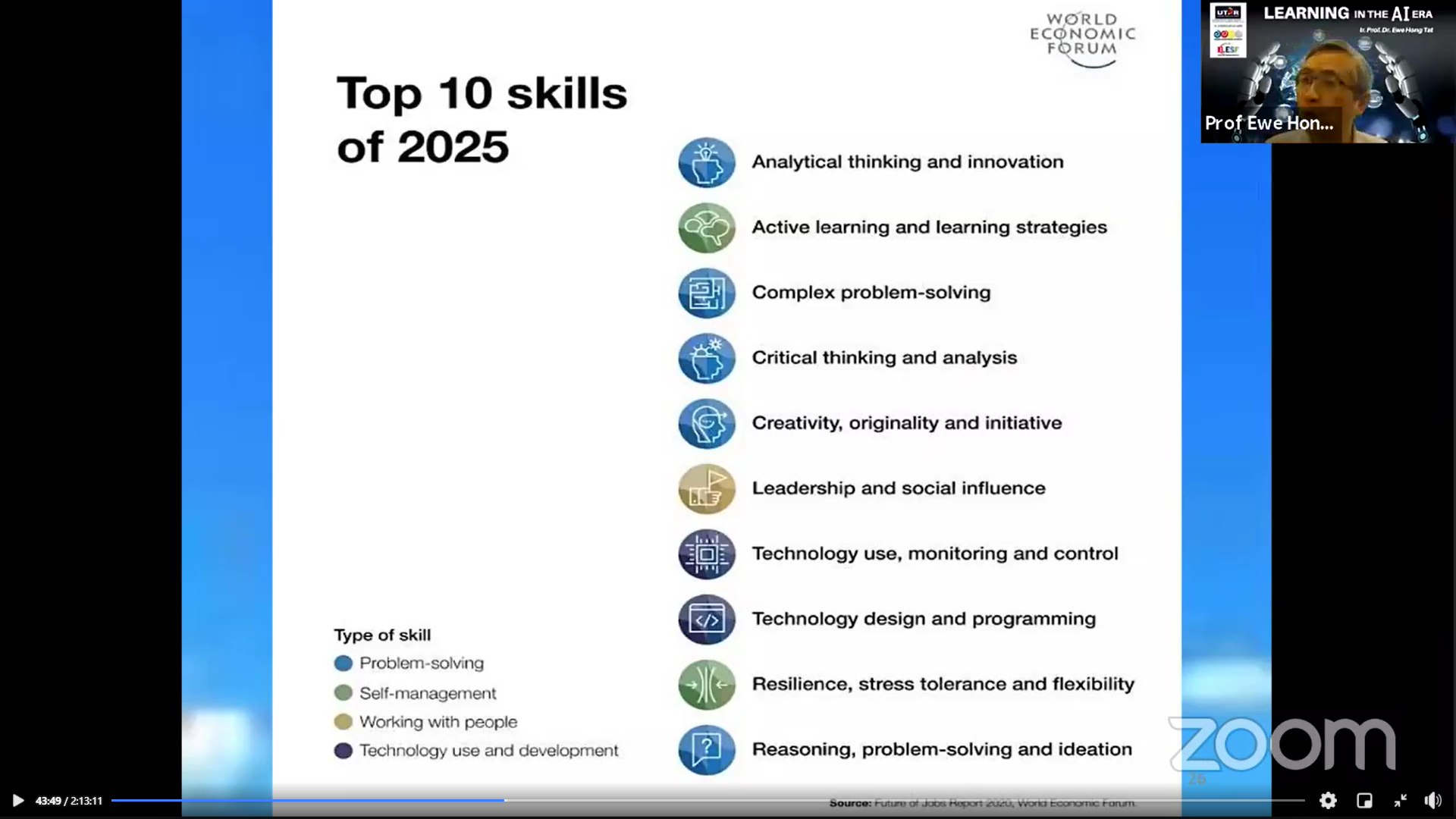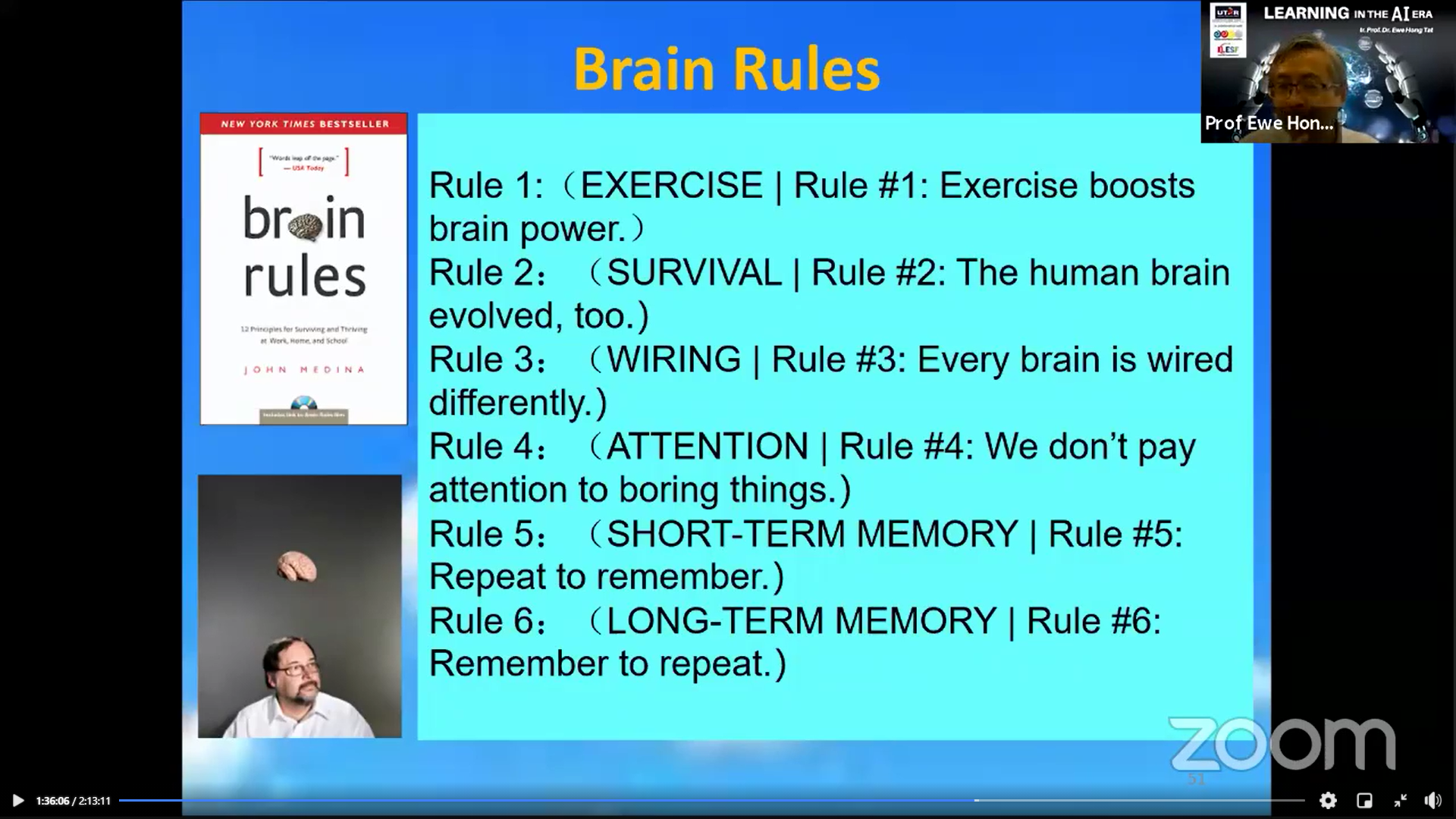

UTAR Centre for Corporate and Community Development
(CCCD) in collaboration with Malaysia Mental Literacy Movement (MMLM)
organised a webinar titled “Learning in the AI Era” on 5 March 2021 via Zoom
with the attendance of 226 participants and 468 views on Facebook live.
Invited to be the speaker for the webinar was UTAR
President Ir Prof Dr Ewe Hong Tat. His webinar aimed at delivering knowledge
on topics, such as Introduction to Technology Revolution Era, Development
and Evolution of Technology, Challenges of AI Era, Skills needed in Job
Market, Education Method, Bloom’s Taxonomy of Learning Domains, Mental
Challenges, Improvement in Education and Ways to prepare ourselves in the AI
Era.
.png)
Prof Ewe during his sharing session
.png)
Prof Ewe explaining the evolution of
economy and intensification of knowledge content to the participants
Prof Ewe emphasised, “Professor Klaus Schwab, Founder
and Executive Chairman of the World Economic Forum mentioned that we are now
entering the beginning of the Fourth Industrial Revolution where there will
be more integration between the physical world and the digital world. Also,
Ray Kurzweil, Google Engineering Director suggested that the year 2045 will
be a year of Technological Singularity; the time where artificial
intelligence (AI) will surpass human intelligence.”
He highlighted, “The Fourth Industrial Revolution is
very important to us because we do not only need knowledge workers but
knowledge workers with a growth mindset and empathy. By having a growth
mindset, the workers will be willing to learn and take up challenges.
Empathy is also very important because it is a link that connects all human
beings together so that we can come out with more personalised and
customised products to cater to human needs.”
.png)
Prof Ewe emphasising the importance of moral and ethical education for knowledge economy
Explaining the quote from Sir Ken Robinson, a British author, speaker and international advisor for education in the arts to government, non-profits, education and arts bodies, Prof Ewe said, “We treat education like industrial manufacturing when, in reality, it’s closer to organic farming.” “The quote suggests that we should provide students with the environment for self-learning, for them to talk to peers, discuss among each other and grow together. We should provide students with a proper environment and a positive campus culture by giving them the motivation and positive mindset as nobody is considered a loser and everybody can release their best potential.”
.png)
Prof Ewe showing and explaining the differences between fixed mindset and growth mindset
.png)
Prof Ewe sharing the challenges of AI
Sharing the challenges of 21st-century
education, Prof Ewe said, “A generation ago, teachers could expect what they
teach to last a lifetime. However, today is no longer the same because we
don’t know what type of jobs will be created in the future, what type of
technology will be invented and what kind of problems need to be solved by
the students. In addition to the fundamental knowledge, teachers must build
the capability and skillsets of students and children, so that they will
continue to learn new things and overcome the problems they face in the
future. ”
.png)
World Economic Forum showing the 16
skills students require in the 21st century


The top 10 skills required in 2020 and
2025
Prof Ewe highlighted the practice of Bloom’s Taxonomy
of Learning Domains and said “This education theory is very popular. It was
adopted by the Ministry of Higher Education and the Ministry of Education to
develop students in three areas, namely cognitive domain (brain), affective
domain (heart) and psychomotor domain (hand). Bloom’s Taxonomy of Learning
Domains is an approach to develop students in a holistic manner and for them
to learn better and improve their knowledge and intelligence not only from
theory but also from hands-on experience.”
Speaking of the mental challenges faced by society,
Prof Ewe suggested, “We always get distracted by many things and thoughts,
therefore, we must all pay attention to bring back our attention. We must
pay attention to what is important and what we need to do now. We always
contact people through the internet and social media but now please remember
to call your inner self.”
“There are many things that come up as urgent in our
daily lives but there are also things that must be considered important.
Most of the time, our tendency makes us attend to things that are urgent
first but I would advise you to find a balance between focusing on urgent
and important things. Please spare some time to the things that are
important in your life,” he suggested.
Nearing the end of the talk, Prof Ewe urged participants to stay focused and be mindful in their daily lives. “A total of 46.9% of people spend their waking hour thinking about other things but not the things that they should be doing, and this mind-wandering makes them unhappy. Therefore, we need to stay focused and be mindful of the things we are doing,” he said.
Other than that, he also recommended participants to practise 12 brain rules, self-motivation theory, good habits, exercise and consume a balanced diet. He said all of these practices will help to create a more pleasant mind and make them a better person.


Prof Ewe showing the 12 brain rules
and recommending participants to practice it
He concluded, “There are three different levels of
education, namely education for survival and work, education for living and
life education. Learning in the AI Era does not only involve education for
survival and work; our lives are beyond that. We should raise the level of
education for living. It teaches us how to appreciate life, how to have a
good hobby, how to balance our work life, family life and so on. Education
for living is important as it will support us when we face all the
challenges from the AI industrial revolution. Knowing the meaning of life
makes life education more meaningful, from there we can help others and
together we can become better.”
The interactive webinar ended with an insightful Q&A
session and group photography.

A group photo at the end of the
webinar
Ir Prof Dr Ewe Hong Tat obtained his Bachelor of
Engineering (First Class Hons) degree in Electrical Engineering from the
University of Malaya, Malaysia; Master of Science degree in Electrical
Engineering and Computer Science from Massachusetts Institute of Technology
(MIT), USA and PhD degree from Multimedia University, Malaysia.
![]()
Wholly owned by UTAR Education Foundation Co. No. 578227-M LEGAL STATEMENT TERM OF USAGE PRIVACY NOTICE